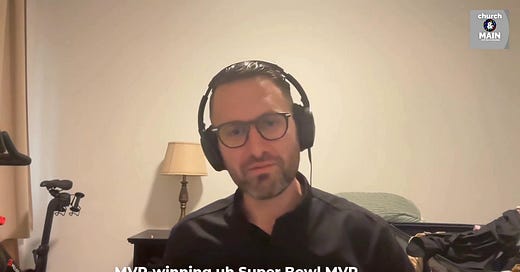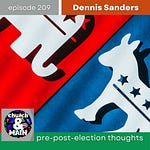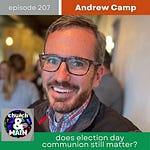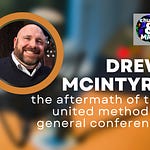Every week, I create sermon clips for my sermons on Riverside. As I grab the sermon from YouTube, I am asked what kind of video I’m uploading. The program wants to know if this is a podcast or a vlog, a lecture or a presentation and other choices. There is no mention of a sermon.
I really never know which one I should choose. Sometimes I choose “presentation” and at other times, I will choose “lecture.”
But what really is a sermon?
It’s not just AI that’s a bit confused about what makes a sermon. Pastors are constantly trying to figure out what a sermon is. Sometimes we think it’s a lecture. Other times, we think it’s like a TED Talk. I remember stumbling on a reel on Instagram of a pastor, at least I think he was a pastor. The pastor acted like he was doing a standup routine instead of preaching. (Though to be honest, he wasn’t going to be a great comedian.)
For me, a sermon is about the proclamation of the Good News. As Paul states in 1 Corinthians 1:23, “but we proclaim Christ crucified, a stumbling block to Jews and foolishness to Gentiles.” A sermon should be about preaching about the life, death, and resurrection of Jesus Christ. Earth and Altar, an Anglican magazine, defines a sermon as the hinge point in a worship service:
The Episcopal Church’s 1979 Book of Common Prayer brought a renewed emphasis on the Holy Eucharist as the principal form of the Christian community’s public worship, but such a focus on the Eucharist in no way diminishes the sermon’s role in the liturgy. In fact, its contextualization within the eucharistic rite can give the sermon even fuller meaning. In the prayer book, the Eucharist contains two parts: the Word of God and Holy Communion. The sermon is situated in the former, after the scripture readings and before the recitation of the creed, the prayers of the people, the confession of sin, and the exchange of peace. While the specific number of readings, psalms, or hymns that precede the sermon, as well as those things that follow it, may vary according to the occasion, the sermon’s place in the liturgy points to its importance as a fulcrum that connects the proclamation of God’s Good News with the community’s active response to that Good News. (emphasis mine)
If the sermon is a liturgical fulcrum, then it is an extension of the gospel, and therefore in its very nature is the proclamation of Good News. (emphasis mine) After all, the word “gospel” means “good news” precisely because that’s what it records—the story of our faith, which is the life, death, and resurrection of Jesus. It is through this story that Christian experience finds its fullest meaning and expression, and so it is this story that sermons tell. Liturgically, the proclamation of the gospel, which precedes the sermon, comes in the form of the scriptural texts, including the Gospel, which are opened for the community’s hearing before they are interpreted in some way by the preacher in the sermon.
I’ve been thinking a lot about what a sermon is all about because of the times we find ourselves in. There is a huge temptation to us this time of proclamation to get on a soapbox and spout tribal bromides that might satisfy what some want to hear and nod along, but not a word that can heal, a word that is as the old gospel song goes, a balm in Gilead.,
A few weeks ago, I had the opportunity to interview Episcopal priest Ben DeHart for the podcast Church and Main. We talked about the ministry taking place at St. John’s Episcopal Church in Park Slope, Brooklyn. The church has grown in the short time DeHart has been rector, but leading the nearly 200-year-old congregation is not without challenges, like running out of money months after he arrived. Our conversation drifted towards preaching. One of the big temptations for me in the times we live in is to focus on the news of the day. And let’s be honest, there are times when the news will end up in your sermon. Living in Minnesota, I couldn’t not talk about the political assassination of former state House Speaker Melissa Hortman and her husband and the wounding of State Senator John Hoffman and his wife the day before. But there is a danger of becoming some kind of holy version of MSNBC instead of preachers of the good news. If evangelical preaching focuses too much on private religion, Dehart thinks the mainline tends to focus too much on corporate religion and it doesn’t fit the personal issues people face everyday. But pastors tend to think they need to do something that major news outlets do much better:
“...Mainliners...I think that at times we err so hard on the corporate or the apocalyptic stuff that I think is very valuable, but we're kind of missing that. Our people are getting better op-eds from the New York Times podcasts, from the stuff that they're flooded with seven days a week. And I do think that people primarily are looking for a word of hope, of real hope, of that way that makes a way out of no way.”
Ben says that among the people who need to hear that word hope, he has to include himself, which is a way of saying that preaching is not simply the pastor preaching a word to the crowd, but the preacher is also proclaiming good news from God to themselves.
He gets on his hobby horse to say that a good sermon is a healing balm and not a lecture:
“...this is a hobby horse of mine, so forgive me, but like, good preaching is not what I do with the people closest to me. It's not lectures. It's not criticism. It's not unsolicited advice. When I get that, what do I do? I run in the exact opposite direction. What has seized me in the past is the balm of Gilead that's too good to be true and yet is.”
Mainline Protestants want to have an impact in the world; we want to make a difference. I think this can be a good trait of our tradition, but we tend to forget that our message is to preach the gospel and trust the Spirit would move people to works of justice and mercy. As I like to say, acts of justice are the fruits of our faith, but you have to have a faith for there to be fruits.
I can’t remember every sermon from chapel during my time at seminary, but I do remember one. It was by Gracia Grindahl, then professor of rhetoric at Luther Seminary. I can remember her finishing up her sermon in her trademark husky, tenor voice with the phrase, “Give Us Gospel!” She was talking to us, future pastors, reminding us what was important. Grindahl uttered this phrase at the end of an illustration where she talked about preaching at a care facility in front of a congregation of seniors. These were people at the edge of death, and Grindahl said the elderly people gathered didn’t want to hear stories about “bunny rabbits,” as she said. “Give us Gospel!”
I think even in these fraught times, people are looking for the gospel. They want to know that they are loved even when they mess things up, that they are consoled during the sad times and that someone in this growing impersonal world cares.
That’s what a sermon is. It is the gospel. It is good news for a world that needs to know the love of a God who won’t ever give up on them.












Share this post